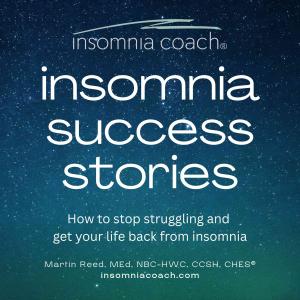Insomnia Coach® Podcast

How Hannah got her sleep back to normal after COVID by caring less about sleep while creating better conditions for sleep (#26)
Listen to the podcast episode (audio only) Like many of us, Hannah began experiencing sleep disruption during the COVID pandemic. When it became clear that lockdowns were likely to be extended, Hannah started to find it harder to fall asleep. Before long, she also found it hard to stay asleep, too. After trying different types of medication and finding they weren't helping much (and came with some unpleasant side-effects), she found a website that shared insomnia tips and advice. After trying a do-it-yourself approach, Hannah realized she would benefit from working with a coach so she could receive personalized support and guidance and so she enrolled in my online coaching course. In this episode, Hannah talks about the new sleep habits she developed and how she changed her relationship with sleep-related thoughts, and tested the sleep-related beliefs that made sleep more difficult. Ultimately, Hannah found that abandoning all attempts to control sleep, accepting difficult nights of sleep and sleep-related worry, committing to new sleep habits, and going about her days as normally as possible really helped her get her sleep back on track. Today, Hannah's sleep is back to normal — she typically averages around seven-and-a-half hours of sleep and is far more resilient to any one-off nights of sleep disruption because she was able to tackle the sleep-related thoughts and behaviors that perpetuate insomnia. Click here for a full transcript of this episode.Click here to hide the transcript. Martin Reed: Welcome to the Insomnia Coach Podcast. My name is Martin Reed. I believe that nobody needs to live with chronic insomnia and that evidence-based cognitive and behavioral techniques can help you enjoy better sleep for the rest of your life. Martin Reed: The content of this podcast is provided for informational and educational purposes only. It is not medical advice and is not intended to diagnose, treat, cure, or prevent any disease, disorder, or medical condition. It should never replace any advice given to you by your physician or any other licensed healthcare provider. Insomnia Coach LLC offers coaching services only and does not provide therapy, counseling, medical advice, or medical treatment. The statements and opinions expressed by guests are their own and are not necessarily endorsed by Insomnia Coach LLC. All content is provided "as is" and without warranties, either express or implied. Martin Reed: Hello, Hannah, thank you so much for taking the time out of your day to come on the podcast. Hannah Vanderpool: Thanks for having me. Martin Reed: It's great to have you on. I always like to start right at the very beginning. So you're going to be no different. I'd love to know if you can remember when your issues with sleep began? And do you have any recollection of what triggered that initial sleep disruption? Hannah Vanderpool: Yeah, I do, actually. It happened about, I would say five or six weeks after the initial lockdown in March, when Coronavirus was really a serious thing and people were being told to stay home. My family and I have lived overseas in developing countries and we homeschooled for years with our kids. So, we actually felt initially like, "Alright, we got this, no problem. We know how to handle chaotic environments, water shortages, et cetera." But I think it was probably after Easter. Hannah Vanderpool: So, worshiping with our church family is a huge deal for us. And we had to do Easter at home. And up until that point, I was like, "I'm doing fine, we're all good." We were healthy, nobody had lost their job. And so we felt good. But then, it was like that was a mark for me. After Easter,






 Visit Podcast Website
Visit Podcast Website RSS Podcast Feed
RSS Podcast Feed Subscribe
Subscribe
 Add to MyCast
Add to MyCast